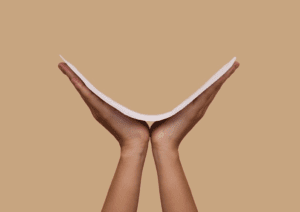Single-use menstrual products such as tampons and pads are a significant contributor globally to single-use plastic waste. They can contain up to 90% plastic.
Sanitary products have become essential for making personal hygiene more accessible and convenient in daily life; however, without proper collection and disposal, these can add a significant amount of waste to the environment. Sanitary waste has hazardous effects – not only on global warming but also on human health and our water resource. Studies have estimated that approximately 121 million women dispose of around eight sanitary pads per menstrual cycle. Meaning that around 12.3 billion disposable pads are added to landfills annually. The varied composition of single-use menstrual products, together with the presence of organic matter after use, makes their recycling technically and economically expensive. As a result, the vast majority of these products are landfilled or incinerated. To tackle this issue, there needs to be a system in place to properly dispose of menstruation waste, especially used sanitary plastic pads. In South Africa, sanitary waste disposal is regulated and governed by the following key legislations: The Western Cape utilises the Western Cape’s Health Care Risk Waste Management Regulations (2013) and the Sanitary Dignity Implementation Framework policy that is meant to guide these issues. Significant contributor to single-use plastic waste In November 2022, the Western Cape Branch Committee for the Department of Environmental Affairs and Development Planning, hosted an event titled ‘Tackling waste and dignity: What can we do about sanitary waste?’. This event attracted nearly 50 attendees and focused on the issue of sanitary waste and the alternatives that can reduce this waste stream, while also offering dignity and empowerment. Bonté Edwards, from Circular Vision, started the evening off with a comprehensive overview of the sanitary waste issue. The problems highlighted included the fact that sanitary wear (feminine hygiene products, nappies, and adult incontinence products) are single-use items that contain 90% plastic. These products are generally individually wrapped in plastic and tend to become environmentally challenging when they are not disposed of properly. Edwards added that this waste stream poses management challenges at landfills and wastewater treatment works. “We need to move away from a linear ‘take-make-dispose’ economy, to one that is more circular and enables resources to be kept in use and made to last.”Zooming in on menstrual products, Edwards referenced a 2021 UNEP study – titled ‘Single-use menstrual products and their alternatives’ – which makes recommendations based on life-cycle assessments and found that, in all circumstances, reusable menstrual products, such as menstrual cups and reusable pads, had substantially lower environmental impacts than commonly available single-use options.
A reusable pad With millions of girls missing three to five days of school each month during their period due to lack of sanitary pads, Shérie de Wet, founder and CEO of Palesa Pads, and her team were determined to find a solution. In 2017, they started manufacturing and distributing high-quality reusable sanitary pads that can be washed and reused each month. The pads can be used for at least five years, replacing the need for 200-300 disposable pads, and allowing girls to stay in school. The stain-resistant fabric is absorbent and waterproof, ensuring no leaks, no stains and no smells. This product offers an alternative option and was lauded for the impact it has on young girls’ lives. Although their focus is on schools, these products can be used by women of all ages. De Wet’s revolutionary product isn’t only a great alternative but is comfortable and effective, while also reducing the impact on the environment. This product can be found online and at Ackermans. Medical-grade alternatives The UNEP study found that reusable menstrual products have a substantially lower environmental impact than commonly available single-use options. The menstrual cup, in particular, has consistently lower impacts than the other product options, both single-use and reusable, making it a clear choice for consumers and policymakers. Zaakira Mahomed, founder of the Mina Foundation, who was also present at the event, introduced the audience to the Mina menstrual cup – a medical-grade silicone cup that gets inserted into the vagina to collect, rather than absorb, menstrual flow. The cup offers a comfortable, leak-free period and can be worn for up to 12 hours. It too can last up to five years and is a great replacement for pads and tampons. Mahomed highlighted the work they do with schools, educating young girls on their bodies and their cycles, and providing them with menstrual cups to ensure that they have a stress-free period. Their product can also be found online and at many Clicks stores. For every cup that is purchased, another cup is donated to a female in need.






